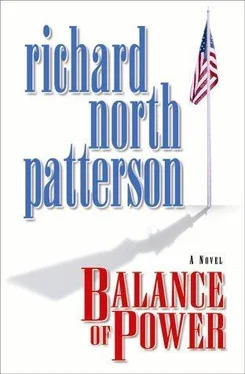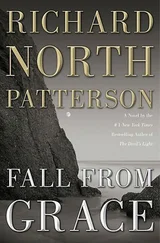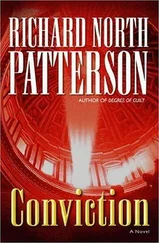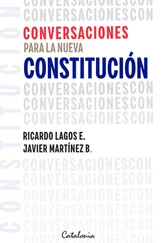Richard Patterson - Balance of Power
Здесь есть возможность читать онлайн «Richard Patterson - Balance of Power» весь текст электронной книги совершенно бесплатно (целиком полную версию без сокращений). В некоторых случаях можно слушать аудио, скачать через торрент в формате fb2 и присутствует краткое содержание. Жанр: Старинная литература, на английском языке. Описание произведения, (предисловие) а так же отзывы посетителей доступны на портале библиотеки ЛибКат.
- Название:Balance of Power
- Автор:
- Жанр:
- Год:неизвестен
- ISBN:нет данных
- Рейтинг книги:5 / 5. Голосов: 1
-
Избранное:Добавить в избранное
- Отзывы:
-
Ваша оценка:
- 100
- 1
- 2
- 3
- 4
- 5
Balance of Power: краткое содержание, описание и аннотация
Предлагаем к чтению аннотацию, описание, краткое содержание или предисловие (зависит от того, что написал сам автор книги «Balance of Power»). Если вы не нашли необходимую информацию о книге — напишите в комментариях, мы постараемся отыскать её.
Balance of Power — читать онлайн бесплатно полную книгу (весь текст) целиком
Ниже представлен текст книги, разбитый по страницам. Система сохранения места последней прочитанной страницы, позволяет с удобством читать онлайн бесплатно книгу «Balance of Power», без необходимости каждый раз заново искать на чём Вы остановились. Поставьте закладку, и сможете в любой момент перейти на страницу, на которой закончили чтение.
Интервал:
Закладка:
Desperate, she answered, "I don't want anyone."
She felt his hand twitch. "You don't want me . You have contempt for me."
Abruptly, his tone had changed to a higher pitch, paranoid and accusatory, the prelude to the near hysteria which issued from some unfathomable recess of his brain. Two nights before, she had awakened, drenched with sweat, from the nightmare of her own death.
Who would care for Marie?
Moments before, their daughter had sat at the kitchen table, a portrait of dark-haired intensity as she whispered to the doll for whom she daily set a place. Afraid to move, Joan strained to see the kitchen from the corner of her eye. John's remaining discipline was to wait until Marie had vanished; lately their daughter seemed to have developed a preternatural sense of impending violence which warned her to take flight. A silent minuet of abuse, binding daughter to father.
Marie and her doll were gone.
"Please," Joan begged.
The cords of her neck throbbed with tension. The next moment
could be fateful: she had learned that protest enraged him, passivity insulted him.
Slowly, the barrel traced a line to the base of her neck, then pulled away.
Joan's head bowed. Her body shivered with a spasm of escaping breath.
She heard him move from behind the chair, felt him staring down at her. Fearful not to look at him, she forced herself to meet his gaze.
With an open palm, he slapped her.
Her head snapped back, skull ringing. She felt blood trickling from her lower lip.
John placed the gun to her mouth.
Her husband. The joyful face from her wedding album, now darkeyed and implacable, the 49ers T-shirt betraying the paunch on his toothin frame.
Smiling grimly, John Bowden pulled the trigger.
Recoiling, Joan cried out at the hollow metallic click. The sounds seemed to work a chemical change in him—a psychic wound which widened his eyes. His mouth opened, as if to speak; then he turned, staggering, and reeled toward their bedroom.
Slumping forward, Joan covered her face.
Soon he would pass out. She would be safe then; in the morning, before he left, she would endure his silence, the aftershock of his brutality and shame.
At least Marie knew only the silence.
Queasy, Joan stumbled to the bathroom in the darkened hallway, a painful throbbing in her jaw. She stared in the mirror at her drawn face, not quite believing the woman she had become. Blood trickled from her swollen lip.
She dabbed with tissue until it stopped. For another moment Joan stared at herself. Then, quietly, she walked to her daughter's bedroom.
Marie's door was closed. With painstaking care, her mother turned the knob, opening a crack to peer through.
Cross-legged, Marie bent over the china doll which once had been her grandmother's. Joan felt a spurt of relief; the child had not seen them, did not see her now. Watching, Joan was seized by a desperate love.
With slow deliberation, Marie raised her hand and slapped the vacant china face.
Gently, the child cradled the doll in her arms. "I won't do that again," she promised. "As long as you're good."
Tears welling, Joan backed away. She went to the kitchen sink and vomited.
She stayed there for minutes, hands braced against the sink. At last she turned on the faucet. Watching her sickness swirl down the drain, Joan faced what she must do.
Glancing over her shoulder, she searched for the slip of paper with his telephone number, hidden in her leather-bound book of recipes. Call me, he had urged. No matter the hour.
She must not wake her husband.
Lifting the kitchen telephone from its cradle, Joan crept back to the living room, praying for courage. On the television, a graceful arc of fireworks rose above the obelisk.
TWO
President Kerry Francis Kilcannon and his fiancée, Lara Costello, watched as a red flare rose above the Mall, bursting into a galaxy of falling stars which framed the Washington Monument.
For this rarity, an evening alone, they had left the annual party for staffers and retreated to the porch on the second floor of the White House. Spread across their table was a white linen cloth, a picnic of cheese and fruit, and a bottle of light chardonnay which cooled in a silver cylinder, a gift from the President of France. Lara took Kerry's hand.
"When I was six," she told him, "our father took us to the fireworks at Crissy Field. I remember holding his hand, watching all those explosions above the Golden Gate Bridge. That's my last memory of being with him."
Turning from the fireworks, Kerry studied the sculpted face—intense dark eyes, high cheekbones, pale skin framed by jet-black hair—which, to her bemusement, had helped Lara rise from a semianonymous political reporter for the Ne w York Times to celebrity as a television journalist. Like many women, Kerry supposed, her self-concept had been fixed in adolescence: then she had not thought of herself as beautiful—though she surely was—but as the perfect student, the dutiful oldest daughter who must help her mother and sisters. It was the dutiful daughter who had achieved success, driven to make Inez Costello proud, to free her younger sisters from the struggle caused by their father's desertion. Even at thirty-two, Kerry knew, her family still defined her.
"What I was hoping you'd remember," he said, "is the scene from To Catch a Thief. Cary Grant and Grace Kelly in Monaco, watching fireworks from her hotel room."
Lara faced him with an amused, appraising look. "I remember that they lay down on the couch, and then the camera panned away. The fireworks were a metaphor."
"Uh-huh. Very 1950s."
Leaning forward, Lara kissed him, a lingering touch of the lips, then rested her cheek against his shoulder. "This is the twenty-first century," she told him. "No metaphors required."
• • •
Afterward, they lay in his canopied bed listening to the last, faint whistling of fireworks. One table lamp still glowed—making love, and after, both needed to see the other's face.
Smiling, she lightly mussed his hair. "You're not too bad," she told him. "At least as Presidents go."
As she intended, this elicited the boyish grin which lit his face and crinkled the corners of his eyes. There had been too little lightness in Kerry's life. Even his first success in politics, election to the Senate at age thirty, had been as surrogate for his brother, Senator James Kilcannon, assassinated in San Francisco while running for President. Lara had been nineteen then; she remembered watching the telecast of James's funeral, the haunted look on Kerry's face as he attended to his widowed mother. So that when, as a reporter for the Ne w York Times , she had met him seven years later, the first thing she noticed was not his fine-featured face, incongruously youthful for a potential President, nor his thatch of chestnut hair, nor even the scar at the corner of one eye. It was the startling contradiction presented by the eyes themselves: their green-flecked blue irises, larger than most, gave Lara the sense—rare in a white male politician—of someone who had seen more sadness than most. Then, she had thought this an illusion, abetted by her memory of the funeral; only later, when Kerry shared the private history he had entrusted to almost no one, did she understand how true it was.
"If so," he answered, "you're free to take it personally. Tongue-tied Catholic boys from Newark don't usually get much practice. Lord knows that Meg and I weren't much good to each other, in any way."
If only, Lara thought, Meg could be dismissed so simply. But her existence affected them still—publicly, because Kerry's lack of an annulment had forestalled them from marrying in the Church; privately, because their love affair had begun while Kerry was married. Its secrecy had saved Kerry's chances of becoming President: only after his divorce and the California primary, when Kerry himself had been wounded by a would-be assassin, had they come together in public.
Читать дальшеИнтервал:
Закладка:
Похожие книги на «Balance of Power»
Представляем Вашему вниманию похожие книги на «Balance of Power» списком для выбора. Мы отобрали схожую по названию и смыслу литературу в надежде предоставить читателям больше вариантов отыскать новые, интересные, ещё непрочитанные произведения.
Обсуждение, отзывы о книге «Balance of Power» и просто собственные мнения читателей. Оставьте ваши комментарии, напишите, что Вы думаете о произведении, его смысле или главных героях. Укажите что конкретно понравилось, а что нет, и почему Вы так считаете.












